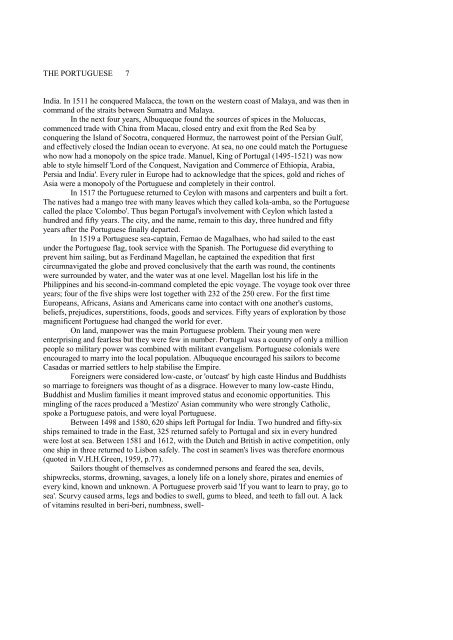Proud and prejudiced - Ferdinandus
Proud and prejudiced - Ferdinandus
Proud and prejudiced - Ferdinandus
Create successful ePaper yourself
Turn your PDF publications into a flip-book with our unique Google optimized e-Paper software.
THE PORTUGUESE 7<br />
India. In 1511 he conquered Malacca, the town on the western coast of Malaya, <strong>and</strong> was then in<br />
comm<strong>and</strong> of the straits between Sumatra <strong>and</strong> Malaya.<br />
In the next four years, Albuqueque found the sources of spices in the Moluccas,<br />
commenced trade with China from Macau, closed entry <strong>and</strong> exit from the Red Sea by<br />
conquering the Isl<strong>and</strong> of Socotra, conquered Hormuz, the narrowest point of the Persian Gulf,<br />
<strong>and</strong> effectively closed the Indian ocean to everyone. At sea, no one could match the Portuguese<br />
who now had a monopoly on the spice trade. Manuel, King of Portugal (1495-1521) was now<br />
able to style himself 'Lord of the Conquest, Navigation <strong>and</strong> Commerce of Ethiopia, Arabia,<br />
Persia <strong>and</strong> India'. Every ruler in Europe had to acknowledge that the spices, gold <strong>and</strong> riches of<br />
Asia were a monopoly of the Portuguese <strong>and</strong> completely in their control.<br />
In 1517 the Portuguese returned to Ceylon with masons <strong>and</strong> carpenters <strong>and</strong> built a fort.<br />
The natives had a mango tree with many leaves which they called kola-amba, so the Portuguese<br />
called the place 'Colombo'. Thus began Portugal's involvement with Ceylon which lasted a<br />
hundred <strong>and</strong> fifty years. The city, <strong>and</strong> the name, remain to this day, three hundred <strong>and</strong> fifty<br />
years after the Portuguese finally departed.<br />
In 1519 a Portuguese sea-captain, Fernao de Magalhaes, who had sailed to the east<br />
under the Portuguese flag, took service with the Spanish. The Portuguese did everything to<br />
prevent him sailing, but as Ferdin<strong>and</strong> Magellan, he captained the expedition that first<br />
circumnavigated the globe <strong>and</strong> proved conclusively that the earth was round, the continents<br />
were surrounded by water, <strong>and</strong> the water was at one level. Magellan lost his life in the<br />
Philippines <strong>and</strong> his second-in-comm<strong>and</strong> completed the epic voyage. The voyage took over three<br />
years; four of the five ships were lost together with 232 of the 250 crew. For the first time<br />
Europeans, Africans, Asians <strong>and</strong> Americans came into contact with one another's customs,<br />
beliefs, prejudices, superstitions, foods, goods <strong>and</strong> services. Fifty years of exploration by those<br />
magnificent Portuguese had changed the world for ever.<br />
On l<strong>and</strong>, manpower was the main Portuguese problem. Their young men were<br />
enterprising <strong>and</strong> fearless but they were few in number. Portugal was a country of only a million<br />
people so military power was combined with militant evangelism. Portuguese colonials were<br />
encouraged to marry into the local population. Albuqueque encouraged his sailors to become<br />
Casadas or married settlers to help stabilise the Empire.<br />
Foreigners were considered low-caste, or 'outcast' by high caste Hindus <strong>and</strong> Buddhists<br />
so marriage to foreigners was thought of as a disgrace. However to many low-caste Hindu,<br />
Buddhist <strong>and</strong> Muslim families it meant improved status <strong>and</strong> economic opportunities. This<br />
mingling of the races produced a 'Mestizo' Asian community who were strongly Catholic,<br />
spoke a Portuguese patois, <strong>and</strong> were loyal Portuguese.<br />
Between 1498 <strong>and</strong> 1580, 620 ships left Portugal for India. Two hundred <strong>and</strong> fifty-six<br />
ships remained to trade in the East, 325 returned safely to Portugal <strong>and</strong> six in every hundred<br />
were lost at sea. Between 1581 <strong>and</strong> 1612, with the Dutch <strong>and</strong> British in active competition, only<br />
one ship in three returned to Lisbon safely. The cost in seamen's lives was therefore enormous<br />
(quoted in V.H.H.Green, 1959, p.77).<br />
Sailors thought of themselves as condemned persons <strong>and</strong> feared the sea, devils,<br />
shipwrecks, storms, drowning, savages, a lonely life on a lonely shore, pirates <strong>and</strong> enemies of<br />
every kind, known <strong>and</strong> unknown. A Portuguese proverb said 'If you want to learn to pray, go to<br />
sea'. Scurvy caused arms, legs <strong>and</strong> bodies to swell, gums to bleed, <strong>and</strong> teeth to fall out. A lack<br />
of vitamins resulted in beri-beri, numbness, swell-


